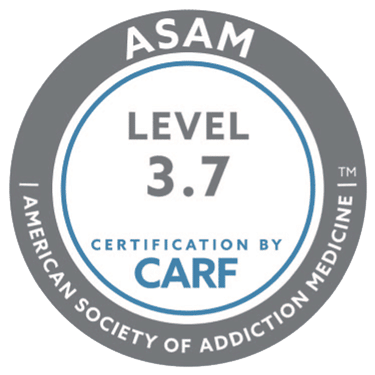A partial hospitalization program (PHP) is an outpatient treatment approach developed to help individuals suffering from substance abuse problems or mental health issues. It involves various types of healthcare providers (such as psychiatrists, physicians, and therapists).
PHP is an intensive structured care mode that’s becoming increasingly common in addiction treatment and more frequently recommended by healthcare professionals.

In addiction treatment, PHP aims to provide a more comprehensive and short-term level of care support than other outpatient programs while giving the individual more freedom since they’re not required to stay at the facility overnight.
Offering all the therapy sessions, group meetings, counseling, and activities included in inpatient addiction treatment minus the full stay, PHP allows for a smoother transition of recovering patients back to everyday life.
How Does PHP Work?
PHP is a step-down approach that follows a residential or inpatient program for addiction treatment.
The purpose of PHP is to prepare the recovering addict for a less intense level of outpatient care by engaging in daily agendas for several hours and then going back home for the night.
With this care mode, the patient receives the help they need to stay on their goal track and stick to the treatment plan while easing back into their day-to-day routine.
The characteristics of PHP include the following:
Structured and comprehensive treatment
While it’s considered a form of outpatient care, PHP is a lot more intensive than regular outpatient addiction treatment. PHP typically provides a minimum of 20 hours of treatment per week, spanning over 5 to 7 days a week.
Such a dense schedule where contact and reporting are required every day makes for a more comprehensive approach to outpatient treatment.
The patient will also be working closely with a team of healthcare providers who’ll create a structured program that addresses the patient’s individual addiction level and circumstances.
The team will include doctors, psychiatrists, social workers, therapists, and nurses to integrate any co-occurring physical or mental health problems into the patient’s treatment plan.
Full-time medical and therapeutic support
PHP is designed for recovering addicts who are transitioning from inpatient hospitalization or residential detox treatment to a regular outpatient program as they try to find their place in the community once again.
Because it’s a transitional or step-down approach, PHP doesn’t provide 24-hour monitoring and medical supervision. Instead, you or your loved one receive the full-time treatment.
What this means is that the required medical and therapeutic support will be provided in business hours format. This system is built to emulate office-based employment.
Such structuring of hours helps you experience intensive care for a significant chunk of the day when you’re in need of support and what it’s like to depend on yourself for the rest of the day as you attempt to regain control over your life.
This format is similar to working a full-time job and leaving the office after business hours are done to engage in your personal life.

Regular and frequent therapy sessions
While PHP provides therapeutic and medical support in a set number of hours per day, this doesn’t mean that the treatment isn’t systematic.
Whether it’s one-on-one therapy, group therapy, or family therapy, partial hospitalization programs will conduct these for the patient several hours a day, multiple days per week.
As such, your or your loved one will receive frequent and regular sessions but still have the option to go home afterward; whether you choose to live by yourself, with a family member(s), or in sober living houses.
Medication management
Most addictive substances and drugs cause changes in the cellular composition or function of the brain and other body parts.
As they set on a recovery journey from misusing such types of substances/drugs, many patients can benefit from supporting medication to help them cope with the physical and mental aftermath of addiction.
Not to mention, some of these health effects compromise the patient’s ability to focus during sessions and activities. Administering FDA-approved medications can help reduce cravings and alleviate withdrawal symptoms.
All these reasons make medication management a primary characteristic of PHP.
The patient may be given the medication every session they come in and may be given doses to take at home. Your or your loved one’s treatment team will monitor the use and dosage of the prescriptions.
Access to a supportive community
Last but not least, access to a support network is another fundamental characteristic of PHP.
Starting from your team of health providers and one-on-one therapy specialists who provide educational and behavioral health services and guidance, to the people you’ll meet and interact with in group meetings.
A patient’s supportive community can also include relationships built with individuals they’re set to meet as part of their aftercare plan.
For example, group counseling sessions, support groups, 12-step programs, or sober living homes.
What Are the Elements of PHP?
Combining the best of the inpatient and outpatient addiction treatment approaches, partial hospitalization programs are made up of several components that are essential for the successful implementation of this hybrid system.
The following are a few of the common elements usually included in a PHP:
Individual therapy
A licensed professional who’ll work with the patient on their mental health is an integral part of PHP. This happens during one-on-one sessions for a set number of hours multiple days a week.
This component is crucial for an addiction treatment plan because it provides the patient with a safe space to deeply and freely discuss their feelings and thoughts.
Patients can open up about whatever issues they’re dealing with in their lives such as past trauma, relationships, family dynamics, depression, anxiety, self-worth, self-esteem, and ambitions.
Working through these issues is key to curbing the triggers and unhealthy behaviors that led to substance abuse in the first place.
You or your loved ones will learn healthy ways to cope with your emotions -both negative and positive- to help you remain on the right track.
Medical services and management
As we mentioned above, most addictive drugs cause alterations in the brain and other body parts.
These negative effects can compromise the patient’s recovery, whether by forcing them to fall back into their deadly habits or causing them to lose focus during PHP sessions and activities.
As such, medical services and management are indispensable components of partial hospitalization programs.
FDA-approved supporting medication (for example, methadone and buprenorphine) can help patients cope with the physical and mental consequences of addiction.
They can help suppress cravings, relieve withdrawal symptoms, and block the “feel-good” effects of certain drugs and alcohol.
Your or your loved one’s PHP treatment team will include doctors and nurses who are capable of selecting the right medication for your condition, calculating the proper dosage, administering medicines, and managing any complications that may arise.
In PHP, the patient may be given the medication every session they come in and may be given doses to take at home. The treatment team will monitor your compliance and ensure you’re not taking too much or stopping suddenly.
Group therapy
Participating in group therapy is another main component of PHP.
In these sessions, professional certified facilitators run meetings with a number of attendees who are going through the same struggles as you or your loved one.
Group counseling focuses on a specific skill or topic for each session, including coping skills, relapse prevention, life skills, stress management, team building, addiction education, and creative expression.
Group therapy is a great chance for different patients to share their personal stories and hardships so they can receive/provide peer support and bond over shared feelings and experiences.
Additionally, group therapy is an opportunity for patients to establish connections with others and build strong relationships that drive them toward a better self.
Family therapy
In this type of therapy, family members are encouraged to attend sessions to work out lingering issues, improve communication with one another, start healing, and rebuild trust.
Addiction can ruin familial and romantic/marital relationships, and the patient isn’t the only person who suffers.
Family therapy provides the needed support for everyone involved and helps prevent enabling behaviors and codependency. It also teaches family members the correct way to offer support during recovery.
Life skills training
PHP also includes life skills training as part of the treatment system to teach patients how to go about daily tasks as recovering addicts.
It can be quite overwhelming for patients to lead a normal life while juggling the struggle with addiction. This type of session is designed to educate you or your loved one on culinary skills, nutrition, and managing personal finances.
Food is a vital aspect of recovery from addiction because it’s a huge factor in maintaining a healthy mind and body. Similarly, learning how to deal with personal finances can help patients feel in control of their lives and keep them from falling back into negative habits that may cause relapse.
Alternative therapies
Your or your loved one’s PHP can include additional alternative and holistic treatments depending on the type of addiction, current condition, and available resources.
These alternative therapies include:
- Music therapy
- Art therapy
- Meditation therapy
- Yoga therapy
- DBT (dialectical behavior therapy)
- Equine therapy
- CBT (cognitive behavioral therapy)
- Breathwork therapy
- Sweat lodge therapy
- Psychodrama therapy
Aftercare planning
The last piece of the PHP puzzle is the component dealing with relapse prevention, known as aftercare planning.
The patient’s treatment team will develop a plan to follow after completing the PHP. It typically includes tactics such as 12-step programs, drug testing, medication, and support groups.
What Are the Benefits of PHP?
Some of the benefits of partial hospitalization programs include:
- Offering a safe environment to discuss and address addiction and its related issues.
- Providing a support system consisting of trained healthcare professionals and people with common struggles.
- Allows patients to access comprehensive medical and therapeutic treatment in one place from various health and wellness professionals.
- Enables patients to transition into normal daily life thanks to the added freedom of not having to stay at the facility overnight. You or your loved one can go to school, work, fulfill caregiver obligations, and participate in various outside activities.
- Compared to inpatient treatment programs, PHP is less costly due to the lack of overnight stays.
What Does the PHP Admission Process Look Like?
PHPs are fundamentally voluntary programs, which means that the patient has to want or at least accept being a participant in one.
Once the decision has been made, the patient will have to go through an assessment to determine whether or not the program is suitable for their condition and will benefit them.
This is done via a series of questions that peer into your current circumstances. Factors that may affect your eligibility include having a stable residence, having time to commit, and the presence of active suicidal thoughts.
If the patient is deemed an appropriate candidate, they’ll be given a schedule and asked to comply with requirements such as attending all the daily sessions for a specific duration.
The cost of PHP differs according to the length of the program, the features included in the program, the location of the program, and the amount covered by insurance.
Speaking of which, insurance plans must cover treatment for substance use, including inpatient and partial hospitalization programs. However, you need to make sure your chosen program isn’t out of network.
Other than insurance, payment options for PHP may include scholarships, grants, and facility-developed individualized plans.
What Are the Challenges of PHP?
While PHP combines the best of both worlds from inpatient and outpatient addiction treatment programs, it can present a few challenges.
For example, PHP requires nearly daily or daily visits to the facility to attend sessions. The sessions themselves can take several hours of the day.
As such, it can be tough to find a way to balance treatment and everyday responsibilities like school or work.
Another challenge is that some patients need 24/7 medical supervision and support.
PHP doesn’t offer that, which makes it a step-down system from inpatient/residential programs and not suitable for severe cases.
Final Thoughts
PHP is a bridge between inpatient and outpatient care.
Patients enter PHP after completing a medically directed detox along with an inpatient addiction treatment program but before moving to regular outpatient rehabilitation services.
If you or anyone you know needs help in their journey to recover from addiction, don’t hesitate to seek help.
PHP is an effective way to reintegrate into everyday life and receive comprehensive therapy and support to do so without relapses.
FAQ
What is a Partial Hospitalization Program (PHP)?
How is PHP different from inpatient and outpatient treatment?
Who is a good candidate for PHP?
What types of services are provided in a PHP?
How long does a PHP last?
How much does a PHP cost?
How do I know if a PHP is right for me?
Can I work or attend school while in a PHP?
What happens after completing a PHP?
Is PHP effective for addiction treatment?







